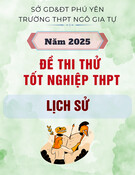
Page 1/13
TRƯỜNG THPT THU XÀ
TỔ: TIẾNG ANH
(Đề thi có 06 trang)
ĐỀ THI THAM KHẢO TN THPT NĂM 2025
MÔN: TIẾNG ANH
Thời gian làm bài: 60 phút
(không kể thời gian phát đề)
Read the following advertisement and mark the letter A, B, C or D on your answer sheet to indicate the
option that best fits each of the numbered blanks from 1 to 6.
LET’S JOIN MULTICULTURAL CAMP
Are you eager to join the upcoming multicultural camp ? Residing in a multicultural camp
significantly enhances our existence in myriad ways. It provides us with the opportunity to engage
with (1) ______ traditions, cuisines, languages, and perspectives. Interactions with individuals
from (2) ______ facilitate a more comprehensive understanding of the world around us. For
example, celebrations (3) ______ Diwali, Chinese New Year, and Thanksgiving serve not only
to unite different cultures but also to impart knowledge regarding one another’s customs.
In educational institutions and professional environments, multicultural settings foster creativity
and innovation through the amalgamation of varied viewpoints. Nevertheless, it is paramount to
approach others’ cultures (4) ______ open-mindedness and respect, as this attitude is essential for
(5) ______ harmony and unity within our communities. Embracing multiculturalism not only
cultivates an appreciation for the distinctiveness of each culture but also contributes to the
development of a more inclusive and vibrant community for all individuals (6) ______.
(Adapted from https://copilot.microsoft.com)
Question 1. A. diverse B. diversely C. diversify D. diversity
Question 2. A. backgrounds various cultural B. various cultural backgrounds
C. cultural backgrounds various D. cultural various backgrounds
Question 3. A. to include B. included C. which included D. including
Question 4. A. by B. with C. from D. for
Question 5. A. developing B. creating C. fostering D. nurturing
Question 6. A. participating B. to participating C. to participate D. participate
Read the following leaflet and mark the letter A, B, C or D on your answer sheet to indicate the
option that best fits each of the numbered blanks from 7 to 12.
Boosting Your Confidence
Looking to improve your self-esteem and feel more confident in your daily life? Here’s how you
can make positive changes!
Confidence Facts: Studies show that only 35% of people report feeling confident in their abilities,
while (7)_____ struggle with self-doubt. Building confidence can help improve your performance
at work and in social situations.
Tips to Boost Your Confidence:
Set realistic goals! Start (8)_____ and reward yourself when you reach milestones.
Surround yourself with positivity! (9)_____ supportive friends and colleagues to boost your self-
esteem.
Focus on your strengths! (10)_____ dwelling on mistakes, concentrate on what you do well.

Page 2/13
Practice self-care! Taking time for yourself can (11)_____ your mood and confidence levels.
Keep learning! Gaining new skills helps (12)_____ a sense of accomplishment.
(Adapted from WWF, Global Stewards)
Question 7. A. other B. others C. another D. the others
Question 8. A. amount B. small C. number D. large
Question 9. A. give in B. seek out C. talk about D. look up
Question 10. A. In case of B. Because of C. Instead of D. On account of
Question 11. A. break B. reduce C. lift D. harm
Question 12. A. create B. increase C. offer D. achieve
Mark the letter A, B, C or D on your answer sheet to indicate the best arrangement of utterances
or sentences to make a meaningful exchange or text in each of the following questions from 13
to 17.
Question 13. a. Grandma: Mark, can you help me increase the font size of this text on my laptop?
It's too small for me to read.
b. Grandma: It works! Everything's so easy to read now. Thanks, dear.
c. Mark: Let me show you... You need to press these two keys together... See? It's easy, isn't it?
A. a-c-b B. b-c-a C. c-b-a D. a-b-c
Question 14. a. Jane: I'm planning to volunteer with a wildlife organization.
b. Max: How are you going to help protect wildlife
c. Max: Why do you want to volunteer?
d. Jane: It offers flexible schedules, and I'll be able to learn about conservation efforts.
e. Max: I think it's too time-consuming. I don't think I'll volunteer.
A. c-d-e-a-b B. b-a-c-d-e C. c-a-e-d-b D. b-d-e-c-a
Question 15. Dear Mark,
a. You won’t believe what happened to me last weekend - I got completely lost in the woods!
b. The experience taught me to always stay on the path and not to underestimate the wilderness.
c. After a few hours of walking in circles, I began to feel a mix of panic and regret for leaving that
familiar path.
d. It all started when I wandered off the main trail to explore a small clearing, thinking I’d easily
find my way back.
e. Thankfully, I spotted a tall tree with some unique markings, which eventually led me back to the
main trail.
Take care,
Sam
A. a – e – d – c – b B. a – d – c – e – b C. b – d – e – c – a D. d – c – e – a – b
Question 16. a. This adaptation to Japan's way of life became easier over time, and I found joy in
exploring traditional tea houses, historic temples, and cherry blossom parks.
b. Arriving in Japan was exhilarating, but navigating Tokyo's busy train stations for the first time
was overwhelming as I tried to make sense of the signs and schedules.
c. In the end, my first experience in Japan was deeply rewarding, teaching me resilience and a
genuine appreciation for stepping out of my comfort zone.
d. Since it was my first time visiting Japan, the culture, language, and even daily routines felt
completely unfamiliar and incredibly fascinating.
e. Embracing these challenges, I focused on learning the basics, like mastering simple phrases and
understanding Japanese customs to feel more connected.
A. e-b-a-d-c B. d-b-e-a-c C. a-b-e-d-c D. b-a-d-e-c
Question 17. a. The first sign of trouble was the weather; a sudden storm swept through, turning
these once-clear skies into a dark, relentless downpour.
b. My summer holiday, which I had eagerly anticipated, quickly turned into a disaster.
c. These setbacks transformed what was meant to be a relaxing getaway into a frustrating ordeal
that we were eager to leave behind.

Page 3/13
d. This unexpected shift forced us to stay indoors, cancelling all the outdoor activities we had
planned.
e. Adding to the misery, the hotel we had booked was far from the charming place it appeared
online, with broken amenities and noisy surroundings.
A. a – d – e – c – b B. b – d – e – a – c C. a – e – d – c – b D. b – a – d – e – c
Read the following passage about the relation between teenagers and their parents and mark the
letter A, B, C, or D on your answer sheet to indicate the correct option that best fits each of the
numbered blanks from 18 to 22.
It is natural for parents (18)_______ and to be blamed for most of the misunderstandings between
them. Young people have always complained, more or less justly, that their parents are
oldfashioned, possessive and dominant; (19)_______ ; that they talk too much about certain
problems and that they have no sense of humor, at least in parent-child relationships. I think it is
true (20)_______ and also forget how they themselves felt (21)_______ . Young people often
irritate their parents with their choices in clothes and hairstyles, in entertainers and music. This is
not their motive. They feel cut off from the adult world into which they have not yet been accepted.
So they create a culture and society of their own. Then, if it turns out that their music or entertainers
or vocabulary or clothes or hairstyles irritate their parents, this gives them additional enjoyment.
They feel they are superior, at least in a small way, and that they are leaders in style and taste. If
you plan (22)_______ , co-operation can be part of that plan. You can charm others, especially
parents, into doing things the ways you want, and impress others with your sense of responsibility
and initiative, so that they will give you the authority to do what you want to do.
(Adapted from https://medium.com)
Question 18.
A. being criticized by their young children at times
B. to be criticized by their young children at times
C. been criticized by their young children at times
D. be criticized by their young children at times
Question 19.
A. that does not trust their children to deal with obstacles
B. which they do not trust their children to deal with obstacles
C. that they do not trust their children to deal with obstacles
D. that it does not trust their children to deal with obstacles
Question 20.
A. that parents often underestimate your teenage children
B. that parents often underestimate their teenage children
C. that parents often underestimate our teenage children
D. that parents often underestimate his teenage children
Question 21.
A. when they were young B. after they were young
C. when they are young D. as well as they are young
Question 22.
A. to be control your life B. to control your life
C. controlling your life D. controlled your life
Read the following passage and mark the letter A, B, C, D on your answer sheet to indicate the best
answer to each of the following questions from 23 to 30.
If you’re new to running, or new to marathons, you might be worried about or even fearful of the
distance. And these feelings are completely understandable, given the fact that more than 42 kilometres
is a very long way. However, more and more people are taking on this challenge every year, and for
very good reasons.

Page 4/13
Obviously, running such a long distance requires a lot of training, and the more you train, the more
your endurance will be enhanced. And of course, as you become more physically active, your heart
and muscles will be stronger, your blood circulation will improve, and you will most likely get in shape
in no time. Additionally, there are also mental and social benefits such as feeling less stressed and more
energized as well as having the chance to meet and establish meaningful relationships with other
people.
If you think about it, running a marathon is also a chance for personal development. Everyone has at
least one fear or insecurity, and for many people, completing a marathon race can seem like an
extremely daunting or even impossible task. Of course, it’s true that this is a big challenge that requires
commitment and perseverance. That being said, every time you step outside out of your comfort
zone and accomplish something new, you will grow stronger and become more confident.
Sometimes, you can actually help many others when you run a marathon. Many runners now combine
their marathon goal with the goal of helping others by participating in races that raise money for charity.
Besides, running in such marathon races will most likely give you all the motivation you need to get
through the exhausting 42-kilometer run. After all, it’s quite difficult to quit when you know that you
are giving help to people in need. (Adapted from https://active.com)
Question 23. According to the passage, all of the following are benefits of running a marathon
EXCEPT _________.
A. Your endurance will start to improve as you train harder and harder.
B. You will feel less stressed when meeting other people.
C. Your muscles will be strengthened since you are more active.
D. You will be able to improve your blood circulation and quickly get in shape.
Question 24. The word “fearful” in paragraph 1 could be best replaced by _________.
A. scary B. frightening C. afraid D. anxious
Question 25. The word “enhanced” in paragraph 2 is OPPOSITE in meaning to _________.
A. preserved B. disseminated C. augmented D. weakened
Question 26. The word “this” in paragraph 3 refers to _________.
A. challenge B. personal development
C. insecurity D. completing a marathon
Question 27. Which of the following best paraphrases the underlined sentence in paragraph 3?
A. Whenever you step outside your comfort zone and succeed in something different, you will
feel a sense of superiority.
B. Every time you venture beyond your comfort zone and do something unique, you will grow
stronger and become less confident.
C. Every time you leave your comfort zone and achieve something new, you will become stronger
and more confident.
D. Each time you move outside your comfort zone and accomplish something odd, you will grow
more resilient and confident.
Question 28. Which of the following is TRUE according to the passage?
A. When you complete a marathon, you will no longer have any fear.
B. Most runners will not run marathons that do not raise money at all.
C. If you want to run a marathon, you need to commit and persevere.
D. You cannot complete a marathon if you do not want to help others.
Question 29. In which paragraph does the writer mention the physical benefits of running?
A. Paragraph 1 B. Paragraph 2 C. Paragraph 3 D. Paragraph 4
Question 30. In which paragraph does the writer discuss personal growth opportunities that come from
running a marathon?
A. Paragraph 4 B. Paragraph 1 C. Paragraph 3 D. Paragraph 2

Page 5/13
Read the following passage about the impact of social media on mental health and mark the letter A,
B, C, or D on your answer sheet to indicate the best answer to each of the following questions from 31
to 40.
[I] In recent years, social media platforms have become a central part of daily life, offering users countless
ways to connect, share, and communicate. [II] While these platforms offer many advantages, experts have
noted rising concerns about their effects on mental health, particularly among young people (Smith &
Anderson, 2018). [III] Studies reveal that excessive social media use can contribute to feelings of anxiety,
depression, and loneliness, despite its intention to promote connection and social interaction (Twenge &
Campbell, 2019). [IV]
A primary reason for these mental health concerns is the tendency for social media users to compare
themselves to others. Platforms like Instagram and Facebook often highlight idealized lifestyles, leading
users to feel inadequate about their own lives. Additionally, the constant notifications and messages
contribute to a "fear of missing out," or FOMO, which keeps individuals in a cycle of checking their
phones, often reducing the quality of sleep and overall well-being.
There is also a growing body of research suggesting a link between social media use and decreased attention
spans. When users frequently switch between apps and notifications, their ability to focus for extended
periods may diminish (Rosen, 2019). This shift in attention can interfere with productivity, especially in
academic and professional settings, where sustained focus is essential.
Addressing these challenges requires a multi-faceted approach. Some mental health professionals suggest
limiting screen time and setting boundaries, such as "device-free" hours before bedtime. Others recommend
engaging in offline activities, like reading or exercising, to reduce dependence on social media and build
healthier habits. According to psychologists, such strategies can enhance mental resilience and allow for
more meaningful, balanced relationships (Robinson & Smith, 2020).
(Adapted from Social Media and Mental Health Research by Twenge, Rosen, and colleagues)
Question 31. Where in paragraph I does the following sentence best fit?
Young people are particularly affected due to their high engagement with these platforms.
A. [II] B. [IV] C. [I] D. [III]
Question 32. The phrase "fear of missing out" in paragraph 2 could be best replaced by ____.
A. aim of satisfaction B. worry of exclusion
C. desire to know D. longing to interact
Question 33. The word "their" in paragraph 3 refers to ____.
A. users B. researchers C. notifications D. professionals
Question 34. According to paragraph 2, which of the following is NOT an effect of social media on
mental health?
A. fear of missing out B. sleep disruption
C. improved self-esteem D. increased anxiety
Question 35. Which of the following best summarizes paragraph 3?
A. Notifications and app-switching harm the focus needed in professional environments.
B. Frequent notifications on social media can decrease users' attention spans and productivity.
C. Distractions from social media only affect students’ performance negatively.
D. Social media contributes to concentration issues that affect users’ academic achievements.
Question 36. The word "enhance" in paragraph 4 is OPPOSITE in meaning to ____.
A. appreciate B. diminish C. reinforce D. intensify
Question 37. Which of the following is TRUE according to the passage?
A. Social media’s primary effect is fostering productivity and interaction.
B. Offline activities can help improve mental health by limiting social media use.
C. Screen time restrictions are not necessary for mental health.
D. Notifications have a minor impact on users’ attention spans.
Question 38. Which of the following best paraphrases the underlined sentence in paragraph 4?
A. Mental health professionals are solely responsible for regulating social media use.
B. A balanced approach is required to mitigate the harmful impacts of social media.
C. Dependence on social media requires a combination of therapeutic techniques.
D. With consistent screen time, individuals can build healthier online habits.



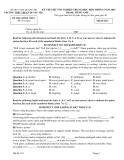
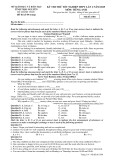
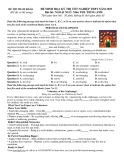
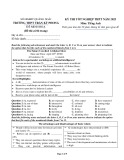
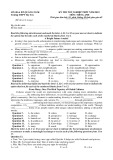
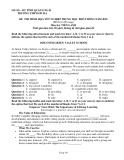
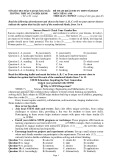
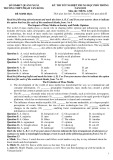

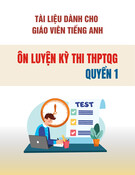
![Đề thi tiếng Anh tốt nghiệp THPT 2025 (Chính thức) kèm đáp án [mới nhất]](https://cdn.tailieu.vn/images/document/thumbnail/2025/20250627/laphong0906/135x160/9121751018473.jpg)




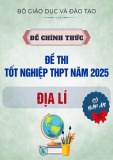

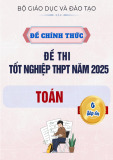

![11 chủ đề ôn tập môn Toán lớp 2 [chuẩn nhất]](https://cdn.tailieu.vn/images/document/thumbnail/2025/20250613/phuongnguyen2005/135x160/74791749803387.jpg)

